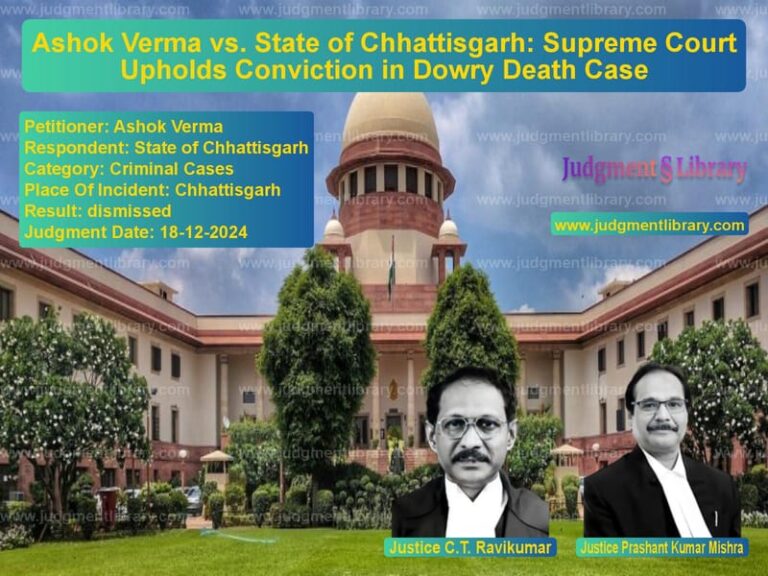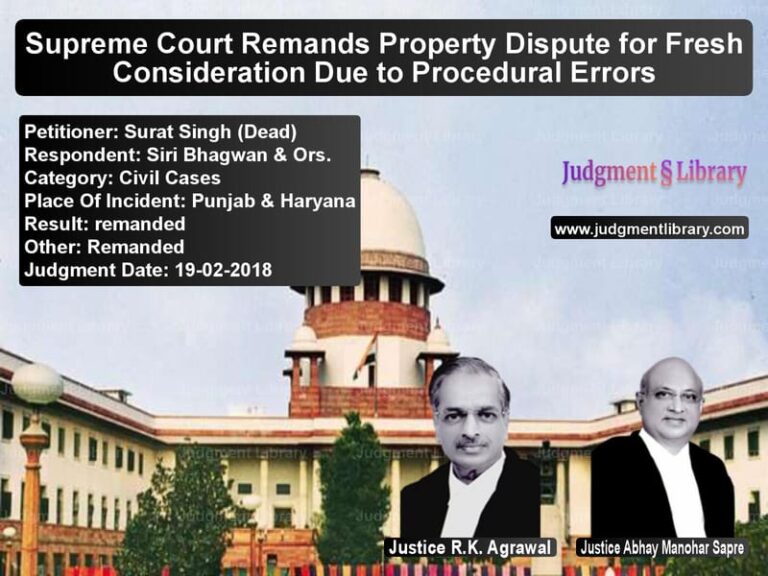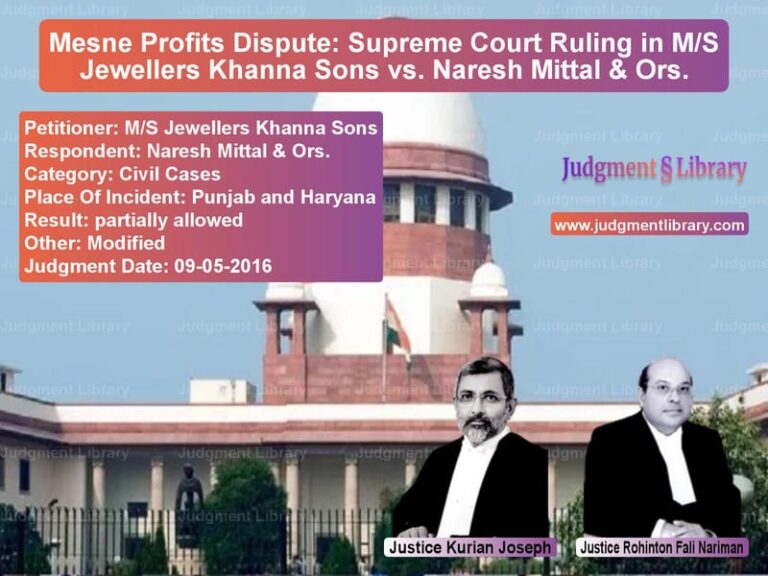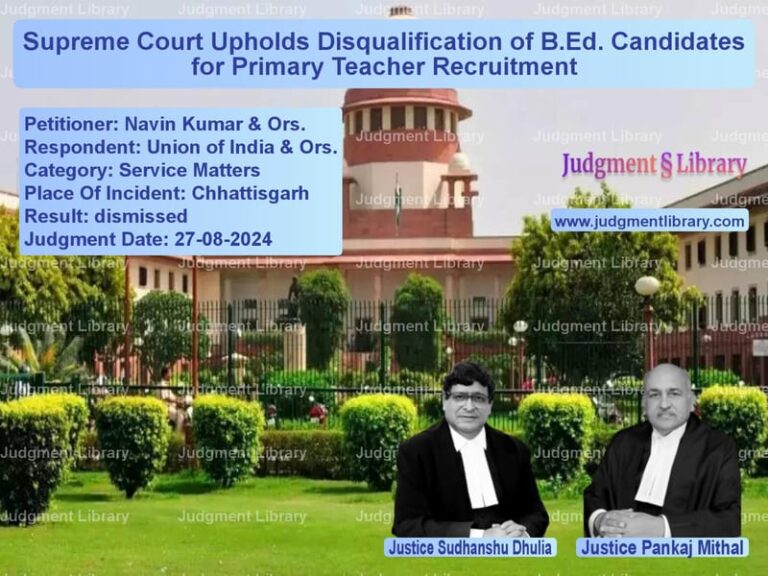Rajya Sabha Election Dispute: Supreme Court Ruling on Corrupt Practices and Electoral Procedures
On 26th September 2018, the Supreme Court of India delivered a significant ruling in the case of Patel Ahmed Mohammad v. Balwant Singh Rajput & Ors., addressing allegations of corrupt practices in a Rajya Sabha election held on 8th August 2017. The case revolved around claims of bribery, undue influence, and improper rejection and acceptance of votes under the Representation of the People Act, 1951.
The Supreme Court upheld the Gujarat High Court’s decision, which rejected the appellant’s request to dismiss the election petition at the threshold. The Court emphasized the importance of fair electoral practices and procedural integrity in election disputes, reaffirming that cases alleging corrupt practices must be decided on merits rather than dismissed on technical grounds.
Background of the Case
The dispute arose from the Rajya Sabha elections in Gujarat, where the appellant, Patel Ahmed Mohammad, was declared elected. The election was challenged by Balwant Singh Rajput through Election Petition No.1 of 2017 before the Gujarat High Court, alleging that:
- The appellant had engaged in corrupt practices of bribery and undue influence under Section 123(1) and (2) of the Representation of the People Act, 1951.
- The Returning Officer had improperly rejected two valid votes and accepted two invalid votes, which materially affected the election result.
The appellant contested the maintainability of the election petition and sought its dismissal through three applications, which were rejected by the Gujarat High Court on 20th April 2018. He then approached the Supreme Court, challenging the High Court’s decision.
Legal Issues and Key Questions
The Supreme Court had to address the following key issues:
- Was the election petition liable to be dismissed at the threshold for non-compliance with procedural requirements?
- Did the allegations of corrupt practices require a full trial instead of dismissal on technical grounds?
- Did the improper rejection and acceptance of votes materially affect the election result?
Arguments by the Appellant (Patel Ahmed Mohammad)
The appellant’s counsel argued that:
- The election petition was procedurally defective as it did not comply with Rules 282, 283, and 284 of the Gujarat High Court Rules, 1993.
- The petitioner failed to remove office objections within the stipulated time, rendering the petition invalid.
- The petition was liable for dismissal under Order VII Rule 11 of the CPC for non-disclosure of cause of action.
- There was no concrete evidence to support allegations of bribery or undue influence.
Arguments by the Respondent (Balwant Singh Rajput)
The respondent countered:
- The petition was filed within the prescribed limitation period and complied with the necessary procedural requirements.
- The rejection of two valid votes and acceptance of two invalid votes materially impacted the election outcome.
- The allegations of bribery and undue influence required a full trial and could not be dismissed summarily.
- The Gujarat High Court had correctly rejected the appellant’s applications for dismissal, ensuring the matter was heard on merits.
Supreme Court’s Observations
The Supreme Court, comprising Chief Justice Dipak Misra, Justice A.M. Khanwilkar, and Justice D.Y. Chandrachud, analyzed the case and upheld the Gujarat High Court’s decision.
The Court ruled:
“Election disputes, especially those alleging corrupt practices, should not be dismissed at the threshold unless they are manifestly frivolous or devoid of merit. Allegations of bribery and undue influence must be examined through a full-fledged trial.”
The Court further emphasized:
“The improper rejection or acceptance of votes can materially affect the result of an election. Such allegations must be tested through proper judicial scrutiny rather than dismissed on procedural technicalities.”
Final Judgment
The Supreme Court upheld the Gujarat High Court’s decision and dismissed the appeal, stating:
“The election petition raises triable issues that warrant a full trial. The appellant’s challenge to procedural compliance does not outweigh the need for substantive electoral justice.”
Impact of the Judgment
This ruling reinforces the principle that election disputes should be decided on merits rather than dismissed on technicalities. Key takeaways from this judgment include:
- Fair electoral process: Allegations of corrupt practices must be thoroughly examined to uphold electoral integrity.
- Judicial scrutiny of election procedures: Improper acceptance or rejection of votes can materially affect election outcomes and must be subject to judicial review.
- Legal precedence: The judgment sets a precedent for future election disputes, ensuring procedural compliance does not override substantive justice.
- Accountability in elections: Candidates and election officers must adhere to the highest standards of fairness and transparency.
This decision underscores the judiciary’s role in safeguarding democratic processes and ensuring free and fair elections.
Petitioner Name: Patel Ahmed Mohammad.Respondent Name: Balwant Singh Rajput & Ors..Judgment By: Justice Dipak Misra, Justice A.M. Khanwilkar, Justice D.Y. Chandrachud.Place Of Incident: Gujarat.Judgment Date: 26-09-2018.
Don’t miss out on the full details! Download the complete judgment in PDF format below and gain valuable insights instantly!
Download Judgment: Patel Ahmed Mohammad vs Balwant Singh Rajput Supreme Court of India Judgment Dated 26-09-2018.pdf
Direct Downlaod Judgment: Direct downlaod this Judgment
See all petitions in Public Interest Litigation
See all petitions in Legislative Powers
See all petitions in Fundamental Rights
See all petitions in Judgment by Dipak Misra
See all petitions in Judgment by A M Khanwilkar
See all petitions in Judgment by Dhananjaya Y Chandrachud
See all petitions in dismissed
See all petitions in supreme court of India judgments September 2018
See all petitions in 2018 judgments
See all posts in Election and Political Cases Category
See all allowed petitions in Election and Political Cases Category
See all Dismissed petitions in Election and Political Cases Category
See all partially allowed petitions in Election and Political Cases Category







